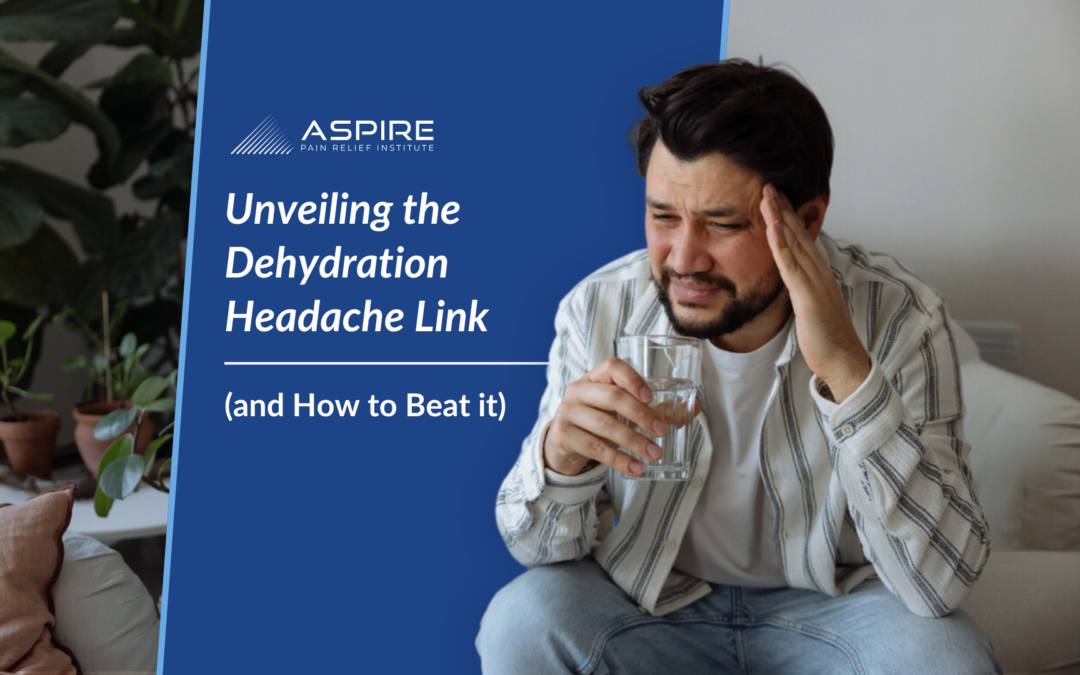Are you dealing with chronic headaches or migraines? Believe it or not, dehydration may be the culprit. Our body depends on fluids to function properly. When we lose fluids, we experience several symptoms, including that familiar, throbbing head pain. In this blog, we’ll take a closer look at the connection between dehydration and headaches. We’ll also review simple strategies for minimizing head pain and when to seek professional, chronic headache treatment.
The Dehydration Surprise: A Common Culprit Behind Headaches
Chances are, you’ve been lectured about the importance of hydration at least once in your life. There are many possible side effects of dehydration, from dizziness and nausea to fatigue and confusion. However, one side effect that often goes overlooked is headaches.
When you’re dehydrated, your blood volume decreases. This reduces the flow of blood and oxygen to your brain, which can actually cause your brain to shrink. While the shrinkage is temporary, it places pressure on the nerves and causes painful headaches. In addition to fluid loss, dehydration creates an imbalance of electrolytes (such as potassium and sodium). Electrolytes play a vital role in nerve and muscle function, as well as brain communication. A lack of electrolytes is linked to many common headache side effects, including difficulty concentrating, memory problems and slow reaction times.
Early Signs of Dehydration-Induced Headaches
There’s no question that dehydration has a negative impact on your body and brain. But, how do you know whether your headache is the result of dehydration or some other source? Here are a few common signs of dehydration-induced headaches:
- Dry mouth and thirst: Dehydration headaches are often preceded by dry mouth.
- Dull pain: Most dehydration-induced headaches begin with a dull, aching pain that worsens over time.
- Fatigue: Dehydration can cause fatigue and tiredness that worsens headache pain.
- Dizziness: Dizziness is another major sign of dehydration. In many cases, dizziness escalates to intense headache pain.
- Mental fog: Cognitive issues, such as mental fog or difficulty concentrating, can be an early sign of dehydration and headaches.
If you recognize any signs of dehydration, take action. By addressing them early on, you can prevent unwanted, painful headaches.
Simple Strategies to Conquer Dehydration Headaches
Do you struggle with dehydration headaches? Here are some simple strategies to keep that pesky pain at bay:
- Drink water: The simplest, most effective way to prevent dehydration-induced headaches is to stay hydrated. As a general rule of thumb, you should drink around eight glasses of water a day. You may need to increase this amount if you’re very physically active. Monitoring your water consumption and carrying a water bottle can help you meet this goal.
- Eat water-rich foods: In addition to drinking plenty of water, it’s helpful to consume foods that have a high water content. These include watermelon, oranges, celery, lettuce and cucumbers.
- Minimize dehydrating substances: While some foods and beverages promote hydration, others can make you become dehydrated more quickly. For example, caffeine and alcohol are known to cause dehydration.
- Maintain electrolyte levels: During intense physical activity, you lose valuable electrolytes. As a result, you may become dehydrated (even if you drink water). To replenish the lost minerals, consider drinking electrolyte-heavy beverages such as sports drinks or coconut water. It’s also a good idea to take regular breaks when exercising.
- Avoid the heat: Hot temperatures can make you become dehydrated more quickly. If it’s especially hot outside, try to find ways to cool down. Examples include sitting in the shade, using a fan or applying a cool compress or cloth.
While these strategies can go a long way in preventing headaches, they don’t always work. If you’re staying hydrated and still experiencing painful headaches, you may need professional treatment.
Where Can I Find Headache Treatment Near Me?
Are your headaches not relenting, despite your best efforts? At Aspire Pain Relief, we offer board-certified physicians who are highly experienced in migraine and facial pain. After considering your unique symptoms, we’ll craft a personalized treatment plan that addresses the underlying cause. We offer a wide range of chronic headache treatments, including the following:
- Neurostimulation
- Injection-based therapies
- Medication management
Whether your headaches are the result of dehydration or an unknown source, we’ll get to the root of it. Schedule a consultation with our headache specialist in Tampa today!

